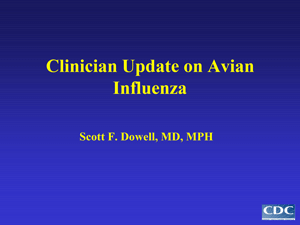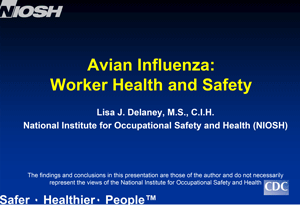
501.372.6677 Little Rock
501.623.7742 Hot Springs
 |
Infection Control: Avian / Bird Flu
 Avian influenza refers to the disease caused by infection with avian (bird) influenza (flu) Type A viruses. These viruses occur naturally among wild aquatic birds worldwide and can infect domestic poultry and other bird and animal species. Avian flu viruses do not normally infect humans. However, sporadic human infections with avian flu viruses have occurred. The links below offer information about avian influenza for different audiences. Source: http://www.cdc.gov/flu/avianflu/
Avian influenza refers to the disease caused by infection with avian (bird) influenza (flu) Type A viruses. These viruses occur naturally among wild aquatic birds worldwide and can infect domestic poultry and other bird and animal species. Avian flu viruses do not normally infect humans. However, sporadic human infections with avian flu viruses have occurred. The links below offer information about avian influenza for different audiences. Source: http://www.cdc.gov/flu/avianflu/
Although avian influenza A viruses usually do not infect humans, rare cases of human infection with these viruses have been reported. Most human infections with avian influenza A viruses have occurred following direct or close contact with infected poultry. Illness in humans has ranged from mild to severe.
 People who have had contact with infected birds may be given influenza antiviral drugs preventatively. While antiviral drugs are most often used to treat flu, they also can be used to prevent infection in someone who has been exposed to influenza viruses. When used to prevent seasonal influenza, antiviral drugs are 70% to 90% effective.
People who have had contact with infected birds may be given influenza antiviral drugs preventatively. While antiviral drugs are most often used to treat flu, they also can be used to prevent infection in someone who has been exposed to influenza viruses. When used to prevent seasonal influenza, antiviral drugs are 70% to 90% effective.
Seasonal influenza vaccination will not prevent infection with avian influenza A viruses, but can reduce the risk of co-infection with human and avian influenza A viruses.
The Best Prevention is to Avoid Sources of Exposure
Currently, the best way to prevent infection with avian influenza A viruses is to avoid sources of exposure whenever possible. Most human infections with avian influenza A viruses have occurred following direct close or prolonged contact with sick or dead infected poultry.
People who work with poultry or who respond to avian influenza outbreaks are advised to follow recommended biosecurity and infection control practices; these include use of appropriate personal protective equipment and careful attention to hand hygiene. In addition, highly pathogenic avian influenza (HPAI) poultry outbreak responders should adhere to guidance from CDC and World Health Organization (WHO) and receive seasonal influenza vaccination annually and take prophylactic antiviral medication during response. They should also be monitored for illness during and after responding to HPAI outbreaks among poultry. Responders to low pathogenic avian influenza (LPAI) outbreaks should also consider this guidance as part of their response plan. Seasonal influenza vaccination will not prevent infection with avian influenza A viruses, but can reduce the risk of co-infection with human and avian influenza A viruses. Source: http://www.cdc.gov/flu/avianflu/prevention.htm